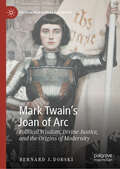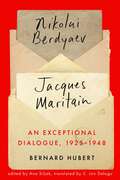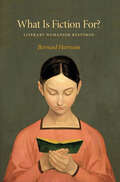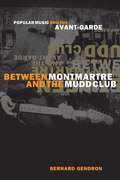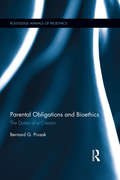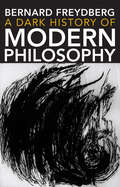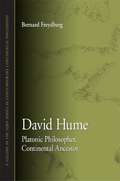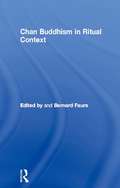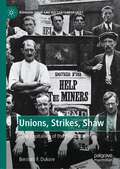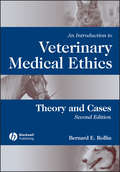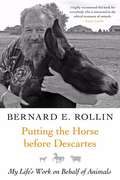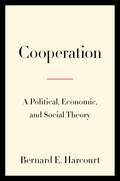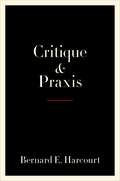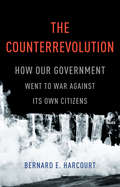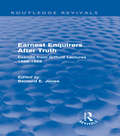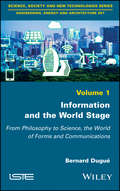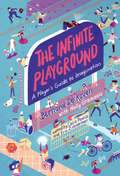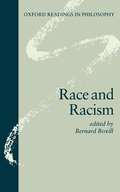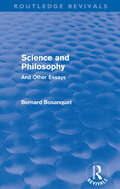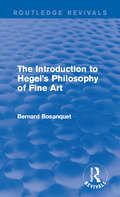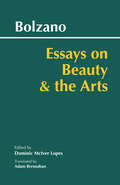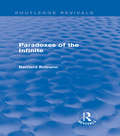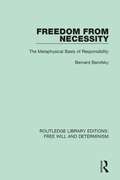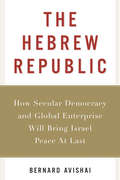- Table View
- List View
Mark Twain’s Joan of Arc: Political Wisdom, Divine Justice, and the Origins of Modernity (Recovering Political Philosophy)
by Bernard J. DobskiThis book is about the political wisdom embodied in Personal Recollections of Joan of Arc by Mark Twain, the self-declared best book by arguably America’s greatest author. More precisely, this study illuminates Twain’s political wisdom by examining his approach to the theological-political problem; it takes up Twain’s handling of the question of whether a providential deity intervenes in human affairs so as to effectuate divine justice on earth and it does this through a commentary on his last complete novel. Through this investigation, Twain prompts his audience to explore the natural, conventional, or divine basis for justice in political life. Such a study is critical for understanding Twain’s corpus, concerned as it is with the tension between material determinism and moral agency. Dobski argues that Twain’s last novel prepares his readers to adopt a “new” understanding of man and his relationship to God, his country, and his fellow man.
An Exceptional Dialogue, 1925–1948: Nikolai Berdyaev and Jacques Maritain
by Bernard HubertIn 1924 the Russian Orthodox philosopher in exile Nikolai Berdyaev ended up in the environs of Paris, where he met and befriended the French Catholic philosopher Jacques Maritain. Coming from different faiths and disparate cultures, they shared a common desire to assert the essential dignity and rights of the human person in an era torn apart by extremism and conflict. They embarked on a joint endeavour to promote ecumenical dialogue and philosophical conversation in interwar Europe. Their collaboration was instrumental in developing a philosophy of Christian personalism and seminal in the emergence of existentialism.Newly translated into English, An Exceptional Dialogue, 1925–1948 reproduces the two thinkers’ correspondence, along with Bernard Hubert’s original introductory essay, his notes to the French edition, and a new introduction by Ana Siljak. An intimate and remarkable portrait emerges. The two men met and corresponded often during their two decades of friendship, their homes became spaces for conversations on religion and philosophy, and together they contributed to the development of a Christian humanism and personalism that inspired such disparate figures as Hannah Arendt and Martin Luther King Jr and that influenced Maritain’s work on the United Nations Universal Declaration of Human Rights.An Exceptional Dialogue, 1925–1948 reveals the connectedness between Russian and European thought, explores the contributions of French-Russian personalism to the history of human dignity, and provides insight into a strain of philosophy often ignored in contemporary scholarship.
What Is Fiction For?: Literary Humanism Restored
by Bernard HarrisonHow can literature, which consists of nothing more than the description of imaginary events and situations, offer any insight into the workings of "human reality" or "the human condition"? Can mere words illuminate something that we call "reality"? Bernard Harrison answers these questions in this profoundly original work that seeks to re-enfranchise reality in the realms of art and discourse. In an ambitious account of the relationship between literature and cognition, he seeks to show how literary fiction, by deploying words against a background of imagined circumstances, allows us to focus on the roots, in social practice, of the meanings by which we represent our world and ourselves. Engaging with philosophers and theorists as diverse as Wittgenstein, Sartre, Merleau-Ponty, Foucault, Derrida, F. R. Leavis, Cleanth Brooks, and Stanley Fish, and illustrating his ideas through readings of works by Swift, Woolf, Appelfeld, and Dickens, among others, this book presents a systematic defense of humanism in literary studies, and of the study of the Humanities more generally, by a distinguished scholar.
Between Montmartre and the Mudd Club: Popular Music and the Avant-Garde
by Bernard GendronDuring the late nineteenth and early twentieth century, popular music was considered nothing but vulgar entertainment. Today, jazz and rock music are seen as forms of art, and their practitioners are regularly accorded a status on par with the cultural and political elite. To take just one recent example, Bono, lead singer and lyricist of the rock band U2, got equal and sometimes higher billing than Pope John Paul II on their shared efforts in the Jubilee 2000 debt-relief project. When and how did popular music earn so much cultural capital? To find out, Bernard Gendron investigates five key historical moments when popular music and avant-garde art transgressed the rigid boundaries separating high and low culture to form friendly alliances. He begins at the end of the nineteenth century in Paris's Montmartre district, where cabarets showcased popular music alongside poetry readings in spaces decorated with modernist art works. Two decades later, Parisian poets and musicians "slumming" in jazz clubs assimilated jazz's aesthetics in their performances and compositions. In the bebop revolution in mid-1940s America, jazz returned the compliment by absorbing modernist devices and postures, in effect transforming itself into an avant-garde art form. Mid-1960s rock music, under the leadership of the Beatles, went from being reviled as vulgar music to being acclaimed as a cutting-edge art form. Finally, Gendron takes us to the Mudd Club in the late 1970s, where New York punk and new wave rockers were setting the aesthetic agenda for a new generation of artists. Between Montmartre and the Mudd Club should be on the shelves of anyone interested in the intersections between high and low culture, art and music, or history and aesthetics.
Between Montmartre and the Mudd Club: Popular Music and the Avant-Garde
by Bernard GendronDuring the late nineteenth and early twentieth century, popular music was considered nothing but vulgar entertainment. Today, jazz and rock music are seen as forms of art, and their practitioners are regularly accorded a status on par with the cultural and political elite. To take just one recent example, Bono, lead singer and lyricist of the rock band U2, got equal and sometimes higher billing than Pope John Paul II on their shared efforts in the Jubilee 2000 debt-relief project. When and how did popular music earn so much cultural capital? To find out, Bernard Gendron investigates five key historical moments when popular music and avant-garde art transgressed the rigid boundaries separating high and low culture to form friendly alliances. He begins at the end of the nineteenth century in Paris's Montmartre district, where cabarets showcased popular music alongside poetry readings in spaces decorated with modernist art works. Two decades later, Parisian poets and musicians "slumming" in jazz clubs assimilated jazz's aesthetics in their performances and compositions. In the bebop revolution in mid-1940s America, jazz returned the compliment by absorbing modernist devices and postures, in effect transforming itself into an avant-garde art form. Mid-1960s rock music, under the leadership of the Beatles, went from being reviled as vulgar music to being acclaimed as a cutting-edge art form. Finally, Gendron takes us to the Mudd Club in the late 1970s, where New York punk and new wave rockers were setting the aesthetic agenda for a new generation of artists.Between Montmartre and the Mudd Club should be on the shelves of anyone interested in the intersections between high and low culture, art and music, or history and aesthetics.
Parental Obligations and Bioethics: The Duties of a Creator (Routledge Annals of Bioethics #14)
by Bernard G. PrusakThis book examines the question of what parental obligations procreators incur by bringing children into being. Prusak argues that parents, as procreators, have obligations regarding future children that constrain the liberty of would-be parents to do as they wish. Moreover, these obligations go beyond simply respecting a child’s rights. He addresses in turn the ethics of adoption, child support, gamete donation, surrogacy, prenatal genetic enhancement, and public responsibility for children.
A Dark History of Modern Philosophy (Studies in Continental Thought)
by Bernard FreydbergThis provocative reassessment of modern philosophy explores its nonrational dimensions and connection to ancient mysteries.Delving beneath the principal discourses of philosophyfrom Descartes through Kant, Bernard Freydberg plumbs the previously concealed dark forces that ignite the inner power of modern thought. He contends that reason itself issues from an implicit and unconscious suppression of the nonrational. Even the modern philosophical concerns of nature and limits are undergirded by a dark side that dwells in them and makes them possible.Freydberg traces these dark sources to the poetry of Hesiod, the fragments of Heraclitus and Parmenides, and the Platonic dialogues and claims that they rear their heads again in the work of Spinoza, Schelling, and Nietzsche. Freydberg does not set forth a critique of modern philosophy but explores its intrinsic continuity with its ancient roots.
David Hume: Platonic Philosopher, Continental Ancestor (SUNY series in Contemporary Continental Philosophy)
by Bernard FreydbergIn the first book of its kind, Bernard Freydberg places David Hume firmly in the tradition of the Platonic dialogues, and regards him as a proper ancestor of contemporary continental philosophy. Although Hume is largely confined to his historical context within British Empiricism, his skepticism resonates with the Socratic Ignorance expressed by Plato, and his account of experience points toward very contemporary concerns in continental thought. Through close readings of An Enquiry Concerning the Human Understanding, An Enquiry Concerning the Principles of Morals, and the essay "On the Standard of Taste," Freydberg traces a philosophy of imagination that will set the stage for wider consideration of Hume within continental thought.
Chan Buddhism in Ritual Context (Routledgecurzon Studies In Asian Religion)
by Bernard FaureThe essays in this volume attempt to place the Chan and Zen tradition in their ritual and cultural contexts, looking at various aspects heretofore largely (and unduly) ignored. In particular, they show the extent to which these traditions, despite their claim to uniqueness, were indebted to larger trends in East Asian Buddhism, such as the cults of icons, relics and the monastic robe.The book emphasises the importance of ritual for a proper understanding of this allegedly anti-ritualistic form of Buddhism. In doing so, it deconstructs the Chan/Zen 'rhetoric of immediacy' and its ideological underpinnings.
Unions, Strikes, Shaw: "The Capitalism of the Proletariat" (Bernard Shaw and His Contemporaries)
by Bernard F. DukoreUnions, Strikes, Shaw: ‘The Capitalism of the Proletariat’ is the first book to treat Bernard Shaw—socialist, dramatist, public speaker and union member—in relation to unions and strikes. For over half a century he urged workers to join unions, which he called, paradoxically, “the Capitalism of the Proletariat,” because as capitalists try to get as much labor as possible from workers while paying them as little as possible, unions try to gain as high wages as possible from employers while working as little as possible. He opposed general strikes as destined to fail, since owners can hold out longer than workers, whose unions have less money to support them during strikes. This book offers background on major strikes in and before Shaw’s time —including the Colorado Coalfield War and the Dublin Lockout, both in 1913—before analyzing the causes, day-by-day events and consequences of Britain’s 1926 General Strike. It begins and ends with examinations of their and Shaw’s relevance to actions on unions and strikes in our own time.
An Introduction to Veterinary Medical Ethics
by Bernard E. RollinOne of the most difficult issues that confronts veterinarians and staff today concerns the profession's obligation to the animal and the sometimes conflicting demands from clients, peers and society. The veterinarian's role has become more complex with new ethical challenges posed by issues such as growing public awareness regarding animal welfare, increasing economic value of companion animals, growth of veterinary specialization, experimentation with alternative and complementary medicine, and concern for pain management and mental well-being of animals. Written by an acknowledged pioneer in veterinary ethics, An Introduction to Veterinary Medical Ethics addresses the ethical challenges that veterinarians face daily as they seek to balance obligations to animal, client, peers, society and self. The book offers a highly readable and approachable introduction to the nature of ethical theory, reasoning and decision-making, and its practical application to veterinary medicine. Now with over 100 real-life veterinary case histories and analysis, this edition also includes new discussions of animal pain, distress and happiness, ethics of critical care, alternative medicine, legal status and value of animals, and Aesculapian authority. An Introduction to Veterinary Medical Ethics: Theory and Cases, Second Edition is recommended as essential reading for all veterinary students and practitioners, as well as those interested in general animal welfare. New edition from an acknowledged pioneer in veterinary ethics; Addresses ethical challenges that veterinary medicine, with over 100 real-life cases; Includes new discussion of legal status and value of animals, alternative medicine, Aesculapian authority, ethics and critical care, and animal pain, distress and happiness; Ideal for veterinary students and practitioners
Putting the Horse before Descartes: My Life's Work on Behalf of Animals
by Bernard E. RollinWhen philosopher Bernard Rollin was six years old, he visited an animal shelter and was told about unwanted dogs being put to sleep. The event shaped his moral outlook and initiated his concern for how animals were treated. In his irreverent memoir,Putting the Horse before Descartes, Rollin provides an account of how he came to educate himself and others about the ethical treatment of animals and work toward improvements in animal welfare. Rollin describes, In witty, often disarming detail, how he became an outspoken critic of how animals were being treated in veterinary and medical schools as well as in research labs. Putting the Horse before Descartesshowcases the passionate animal advocate at his best. He recalls teaching veterinary students about ethical issues. He also recalls face-offs with ranchers and cowboys about branding methods and roping competitions in rodeos. In addition, he describes his work to legally mandate more humane conditions for agricultural and laboratory animals. As public concern about animal welfare And The safety of the food supply heighten, Rollin carries on this work all over the world-in classrooms, lecture halls and legislatures, meetings of agricultural associations and industrial settings, As well as in print. Putting the Horse before Descartes, ultimately, Is more than a memoir. Rollin offers a wide-ranging discussion of ethical issues in many settings and he testifies To The myriad ways that people of good conscience accept their ethical responsibility in regard to animals.
Cooperation: A Political, Economic, and Social Theory
by Bernard E. HarcourtLiberal democracy is in crisis around the world, unable to address pressing problems such as climate change. There is, however, another path—cooperation democracy. From consumer co-ops to credit unions, worker cooperatives to insurance mutuals, nonprofits to mutual aid, countless examples prove that people working together can extend the ideals of participatory democracy and sustainability into every aspect of their lives. These forms of cooperation do not depend on electoral politics. Instead, they harness the longstanding practices and values of cooperatives: self-determination, democratic participation, equity, solidarity, and respect for the environment.Bernard E. Harcourt develops a transformative theory and practice that builds on worldwide models of successful cooperation. He identifies the most promising forms of cooperative initiatives and then distills their lessons into an integrated framework: Coöperism. This is a political theory grounded on recognition of our interdependence. It is an economic theory that can ensure equitable distribution of wealth. Finally, it is a social theory that replaces the punishment paradigm with a cooperation paradigm.A creative work of normative critical theory, Cooperation provides a positive vision for addressing our most urgent challenges today. Harcourt shows that by drawing on the core values of cooperation and the power of people working together, a new world of cooperation democracy is within our grasp.
Critique and Praxis
by Bernard E. HarcourtCritical philosophy has always challenged the division between theory and practice. At its best, it aims to turn contemplation into emancipation, seeking to transform society in pursuit of equality, autonomy, and human flourishing. Yet today’s critical theory often seems to engage only in critique. These times of crisis demand more.Bernard E. Harcourt challenges us to move beyond decades of philosophical detours and to harness critical thought to the need for action. In a time of increasing awareness of economic and social inequality, Harcourt calls on us to make society more equal and just. Only critical theory can guide us toward a more self-reflexive pursuit of justice. Charting a vision for political action and social transformation, Harcourt argues that instead of posing the question, “What is to be done?” we must now turn it back onto ourselves and ask, and answer, “What more am I to do?”Critique and Praxis advocates for a new path forward that constantly challenges each and every one of us to ask what more we can do to realize a society based on equality and justice. Joining his decades of activism, social-justice litigation, and political engagement with his years of critical theory and philosophical work, Harcourt has written a magnum opus.
The Counterrevolution: How Our Government Went To War Against Its Own Citizens
by Bernard E. HarcourtA distinguished political theorist sounds the alarm about the counterinsurgency strategies used to govern AmericansMilitarized police officers with tanks and drones. Pervasive government surveillance and profiling. Social media that distract and track us. All of these, contends Bernard E. Harcourt, are facets of a new and radical governing paradigm in the United States--one rooted in the modes of warfare originally developed to suppress anticolonial revolutions and, more recently, to prosecute the war on terror.The Counterrevolution is a penetrating and disturbing account of the rise of counterinsurgency, first as a military strategy but increasingly as a way of ruling ordinary Americans. Harcourt shows how counterinsurgency's principles--bulk intelligence collection, ruthless targeting of minorities, pacifying propaganda--have taken hold domestically despite the absence of any radical uprising. This counterrevolution against phantom enemies, he argues, is the tyranny of our age. Seeing it clearly is the first step to resisting it effectively.
Earnest Enquirers After Truth: A Gifford Anthology: excerpts from Gifford Lectures 1888-1968 (Routledge Revivals)
by Bernard E JonesFirst published in 1970, Bernard E. Jones’s selection of Gifford lectures includes excerpts from the writings of over ninety scholars who occupied a Gifford Chair between 1888 and 1968. Lord Gifford had asked his lecturers to be ‘honest to God’, insisting that they should be ‘earnest enquirers after truth’ and had always envisaged the lectures being published. Dr Jones’s anthology is arranged under headings suggested by phrases from Lord Gifford’s will. The selection, which includes names such as William James, A.N. Whitehead, Temple, Barth, Brunner, Bultmann, Niebuhr and Tillich, was made in such a way that the reader would be able to really grasp what natural theology is about. Bernard Ewart Jones served as a Methodist minister, before being appointed to the Lewins Chair of Philosophy at his old college, Hartley Victoria, Manchester. He was awarded a doctorate by the University of Leeds in 1966 for his thesis on ‘The Concept of Natural Theology in Gifford Lectures’.
Information and the World Stage: From Philosophy to Science, the World of Forms and Communications
by Bernard DuguéModern science is at a tipping point. A new page in the history of knowledge opens with the “information paradigm”, a notion which is gradually supplanting the old mechanistic vision inherited from Galileo and Newton.This book presents an overview of the place of information and communications in our time, explaining some reasons for focusing on these two notions. All areas of knowledge are concerned: philosophy, social sciences, biology, medicine, as well as physics, the so-called “queen of sciences”, from quantum to cosmos. Quantum dynamics is particularly decisive for thinking about the phenomena of matter while offering a lever to understand the functioning of elementary information in nature. The central scientific thesis of this essay is then developed: physics has two components, concerning “communications” and “arrangements”. This book is intended for scientific scholars as well as those with just a general interest who are anxious to understand the major evolutions that are taking shape in fields of knowledge in the 21st Century.
The Infinite Playground: A Player's Guide to Imagination
by Bernard De KovenIn his final work, a visionary game designer reveals how a surprising range of play-based experiences can unlock our imagination and help us capture the power of fun and delight.Bernard De Koven (1941-2018) was a pioneering designer of games and theorist of fun. He studied games long before the field of game studies existed. For De Koven, games could not be reduced to artifacts and rules; they were also about experiencing fun. This book, his last, is about the imagination: the imagination as a plaything, a gateway to wonder. The Infinite Playground extends a play-centered invitation to experience the power and delight unlocked by imagination. It offers a curriculum for playful learning, as De Koven guides the readers through a series of observations and techniques, interspersed with games.
Race And Racism
by Bernard BoxillIn this volume, Boxill has collected a wide range of analytical writing that discusses the nature of these controversial ideas. With an introduction exploring the themes and conflicting ideas present in the book, and including a previously unpublished piece on the alleged racism of Immanuel Kant, this book will stimulate a critical understanding of the true meaning and far-reaching implications of an understanding of race and racism.
Science and Philosophy: And Other Essays (Routledge Revivals)
by Bernard BosanquetFirst published in 1927, Science and Philosophy: And Other Essays is a collection of individual papers written by Bernard Bosanquet during his highly industrious philosophical life. The collection was put together by Bosanquet’s wife after the death of the writer and remains mostly unaltered with just a few papers added and the order of entries improved. The papers here displayed consist of various contributions Bosanquet made to Mind, the Proceedings of the Aristotelian Society, the International Journal of Ethics and other periodicals, as well as work from volumes of lectures and essays under his own or other editorship. Throughout the collection, Bosanquet considers the relationship between science and philosophy. The two subject areas became increasingly intertwined during Bosanquet’s lifetime as scientific writers grew more interested in the philosophical investigation of the concepts which underlined their work and philosophical thinkers recognised the importance of the relationship between mathematics and logic as well as that between physics and metaphysics. The first essay in this volume discusses this idea explicitly and all subsequent articles may be regarded as essays in support of the main discussion with which the volume opens.
The Introduction to Hegel's Philosophy of Fine Art: Translated From The German With Notes And Prefatory Essay (classic Reprint) (Routledge Revivals)
by Bernard BosanquetOriginally published in 1905, Bosanquet’s translation of Hegel’s Philosophy of Fine Art brings Hegel’s commentary and analysis of what constitutes beauty and fine art to an English audience as well as presenting his own viewpoints on the work and what is at the heart of true philosophical theory. This title will be of interest to students of philosophy and art.
Essays on Beauty and the Arts (Hackett Classics)
by Bernard BolzanoBernard Bolzano&’s (1781–1848) writings in aesthetics are clear, concise, and explicit about method. Provocative and revisionary, they champion broad views of beauty, the arts, and their social function. Dominic McIver Lopes's introductory materials place Bolzano's essays in context, give them a new interpretation, and map out how to teach them, in full or in part, in a variety of courses.
Paradoxes of the Infinite (Routledge Revivals)
by Bernard BolzanoParadoxes of the Infinite presents one of the most insightful, yet strangely unacknowledged, mathematical treatises of the 19th century: Dr Bernard Bolzano’s Paradoxien. This volume contains an adept translation of the work itself by Donald A. Steele S.J., and in addition an historical introduction, which includes a brief biography as well as an evaluation of Bolzano the mathematician, logician and physicist.
Freedom from Necessity: The Metaphysical Basis of Responsibility (Routledge Library Editions: Free Will and Determinism #6)
by Bernard BerofskyThis book, first published in 1987, is about the classic free will problem, construed in terms of the implications of moral responsibility. The principal thesis is that the core issue is metaphysical: can scientific laws postulate objectively necessary connections between an action and its causal antecedents? The author concludes they cannot, and that, therefore, free will and determinism can be reconciled.
The Hebrew Republic
by Bernard AvishaiPolitical economist Bernard Avishai has been writing and thinking about Israel since moving there to volunteer during the 1967 War. now he synthesizes his years of study and searching into a short, urgent polemic that posits that the country must become a more complete democracy if it has any chance for a peaceful future. He explores the connection between Israel's democratic crisis and the problems besetting the nation--the expansion of settlements, the alienation of Israeli Arabs, and the exploding ultraorthodox population. He also makes an intriguing case for Israel's new global enterprises to change the country's future for the better. With every year, peace in Israel seems to recede further into the distance, while Israeli arts and businesses advance. This contradiction cannot endure much longer. But in cutting through the inflammatory arguments of partisans on all sides, Avishai offers something even more enticing than pragmatic solutions--he offers hope.
